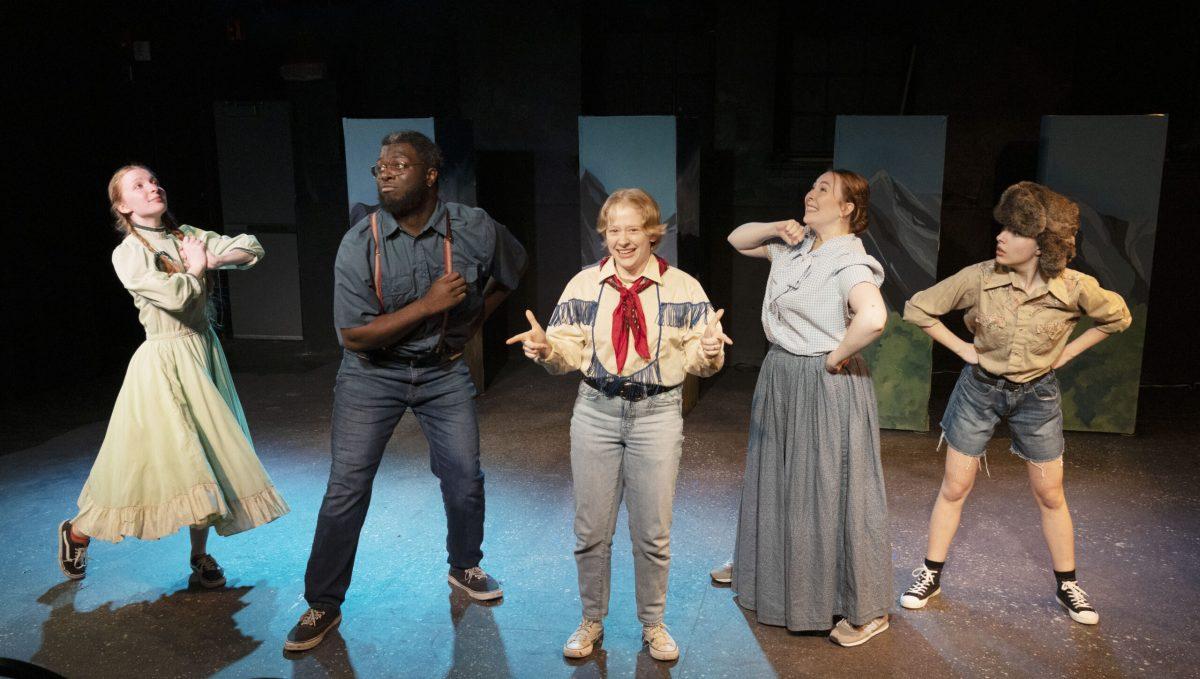In a show that began with encouraged cursing from the audience and ended with watching the entire cast go skinny dipping in clothes that revealed artistically-placed patches of hair, Rowan Lab Theater’s “The Trail to Oregon!” doubled down on the club’s reputation for bringing experimental and absurd shows to the black box theater of Bunce Hall.
The show, a spoof of the 1974 computer game “The Oregon Trail,” follows a family of Mother (Alexa St. Clair), Father (Rachel Kumor), Daughter (Jenna Hopkins), Son (Erica Gerald), Grandpa/Cletus Jones (Taye Hopkins) and McDoon (Thomas Burgel), as they all travel down the Oregon Trail in the 1800s.
At the start of the show, audience members are instructed to yell out their name suggestions for the family members in true “name your wagon party” fashion. For the Saturday, April 15, production, the father was quickly named Fish, the mother became Count Contessa, their teenage daughter was Melanoma, the seven-year-old son was Big Bitch, and the grandfather took the name Lightning McQueen. These names were seamlessly coordinated into the show through dialog and songs.
Another unique aspect of the show is that the actors must prepare five different endings — one for the potential death of each character. Prior to the show beginning, audience members were instructed to act as God and given a small slip of paper to vote on which member of the family they would prefer to die of dysentery at the end show. On Saturday, Melanoma reached her unfortunate demise in the song “You Gotta Go” as the sound of flatulence accompanied her delicate vocals.
While this may add an additional level of complexity to the performance for the actors, the cast and crew seemed unfazed as they took the audience through over an hour and a half of absurdist humor and pioneer-related jokes.
“I mean, it’s a beast of a show,” director Dave Martinek said. “But we had such a great support system. The cast was fantastic to work with. My co-director, Gian [Verderose]… was really great to work with and we just had a really wonderful support system, so it made the process as easy as possible.”
Both co-directors Martinek and Gian Verderose helmed a creative team composed entirely of students. From stage manager Maria Dixon to costume designers Kenzie McClure and Dakota Dekovitch, Verderose noted that not a single professor could be found within the theater — that is unless they were in the audience.
Verderose also acted as the choreographer for the show, adding his and Martinek’s own flair to a show that originally lacked much movement and dance.
“The original is so stagnant. They don’t move, it’s very park-and-bark,” Verderose said. “So I got to choreograph a lot of it and it was all very, very fun… a lot of the stuff was original, but every now and then Dave [Martinek] and I would really like the vibe of a video and I would learn it for him and change it to our needs.”
Much of the direction of the show stemmed from a need to pay homage to the original — but with Martinek and Verderose’s unique additions. As fans of the show, the actors also took inspiration from the original production when it came to crafting their characters.
“I’ve been a huge StarKid fan since 2015 — give or take — so I’ve seen this show about a gazillion times front to back,” Hopkins, who played Grandpa, said. “I definitely was inspired by [the original actor,] Corey Dorris’ Grandpa and Cletus, but I was really glad to be able to work through this and actually put some of myself into the process as a whole.”
Although nearly all of the cast members are theater majors who have performed in Rowan theater productions prior to “The Trail to Oregon!,” Rowan Lab Theater’s reputation as a learning environment also attracted newcomer and vocal music education major Thomas Burgel.
“I was kind of nervous because the last time I did theater, I was a senior in high school,” Burgel said. “And now I’m a junior in college, so it’s a big time gap… But I enjoyed the hell out of it — the whole process, not just performing.”
The process Burgel referred to included weeks of the audition process, long rehearsals and laughing at the original script that is described in the playbill’s director’s note as “loud, direct, self-aware and intimate.”
“We’re allowed to have fun,” Verderose said. “I find that the mainstage seasons are very like, depressing and droll and to fill some deeper artistic need.”
Upon Verderose’s prompting, Martinek identified a quote from Demetri Martin that the two have taken to heart as they directed this show: “If it’s not funny, it’s art.”
And while Martinek and Verderose drove the metaphorical wagon, it was the collaborative effort from the student actors and crew members that brought to life the vision of Martinek and Verderose, and more than adequately fulfilled the purpose of Lab Theater.
“I think what Lab either does or should stand for is that you just have to go and do it,” said Elliot Colahan, the show’s co-music director and accompanist. “And it’s not going to be perfect. And things are going to fall apart — quite literally, including wagons. But something wonderful is going to come out of it and that’s a really powerful, wonderful thing. And you just have to take a leap of faith and trust in God. Hopefully, he doesn’t give you dysentery.”
For questions/comments about this story email [email protected] or tweet @TheWhitOnline.























































































































































!["Working with [Dr. Lynch] is always a learning experience for me. She is a treasure,” said Thomas. - Staff Writer / Kacie Scibilia](https://thewhitonline.com/wp-content/uploads/2025/04/choir-1-1200x694.jpg)








































